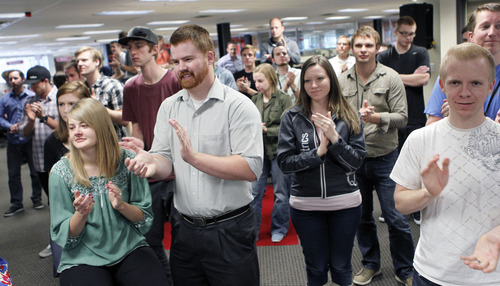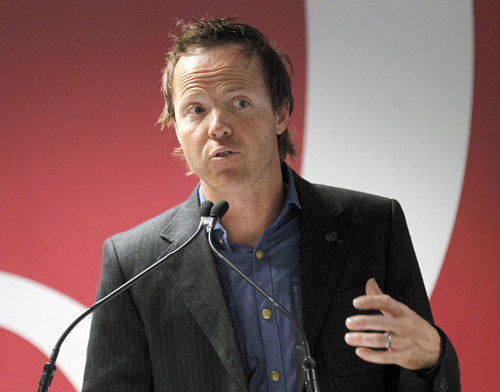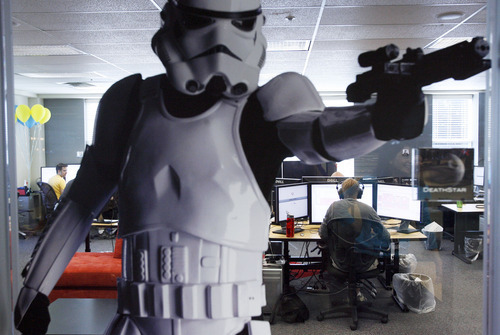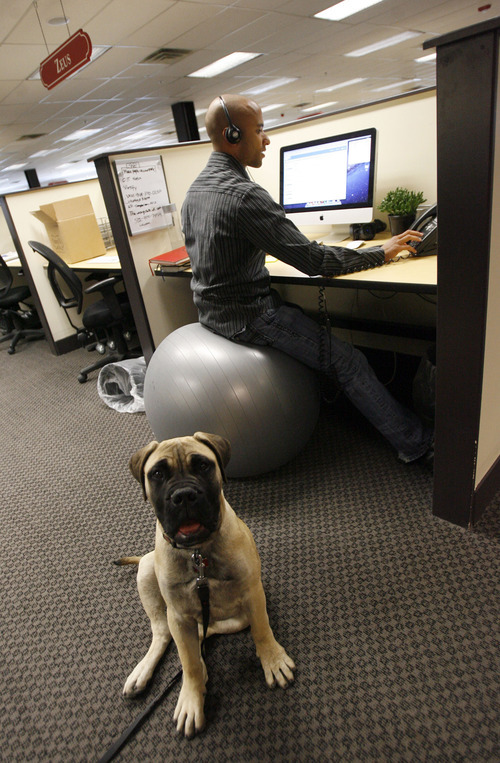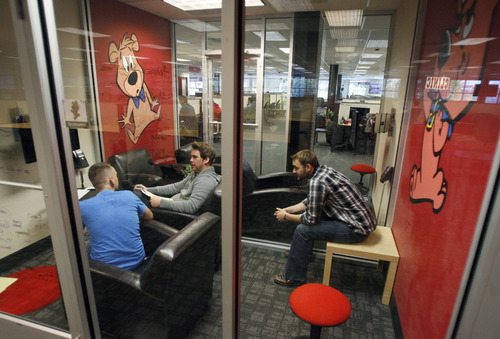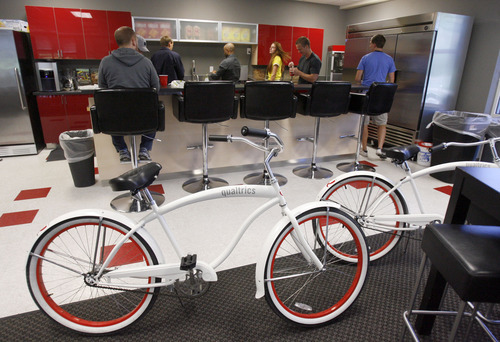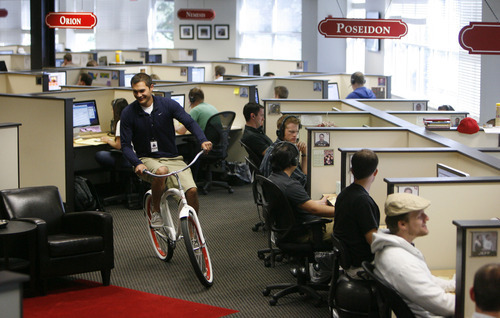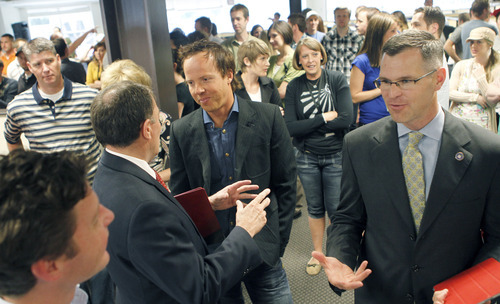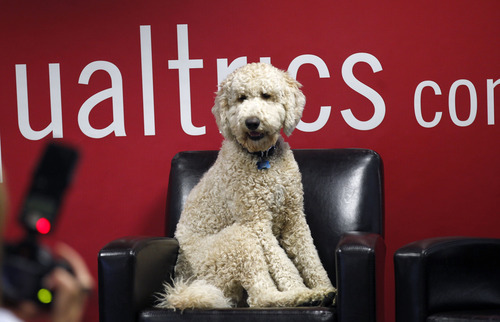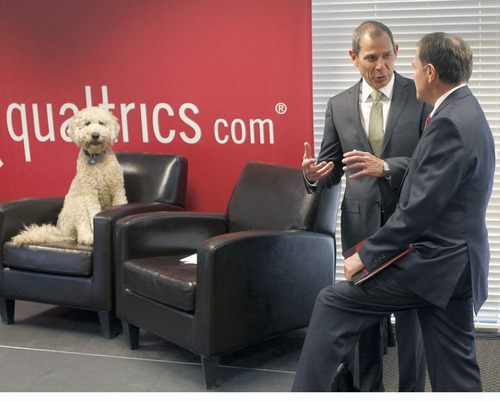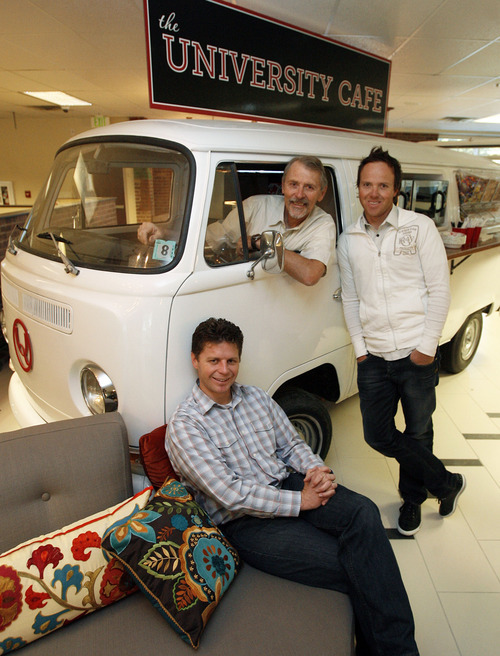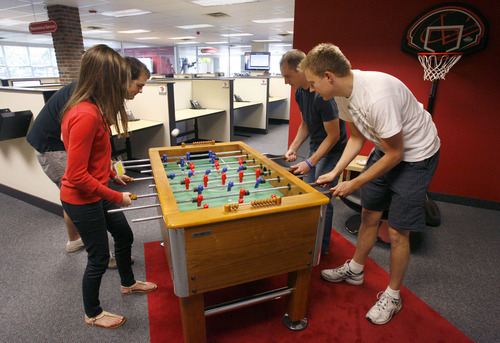This is an archived article that was published on sltrib.com in 2012, and information in the article may be outdated. It is provided only for personal research purposes and may not be reprinted.
Qualtrics Labs Inc. is a Provo-based company that . . .
A. Produces Web-based software for surveys.
B. Has had triple-digit growth for the past five years.
C. Has an old VW bus parked in the middle of its offices.
D. All of the above.
If you picked D, you're beginning to understand the charm of one of the state's most successful companies of late, what Forbes recently called "tech's hidden gem in Utah."
Qualtrics produces three Web-based products — its Research Suite, which helps companies and schools conduct their own custom-made surveys and data analysis; Site Intercept, which allows websites to get feedback from visitors; and 360, a tool to help human resource operations assess employee performance.
The 200-employee firm, which is housed in the old Dynix building nestled near the Wasatch Mountains on the northern tip of Provo, has seen a rocket-like trajectory of success since it set up stakes in Utah County in 2002.
Now, Qualtrics is ready for the big time. It turned down an offer to be bought for $500 million and instead accepted $70 million funding from renowned Silicon Valley venture capitalists Sequoia Capital and Accel Partners, which funded the launches of Apple and Facebook. Qualtrics executives claim it is the biggest first-round infusion of capital in Utah's history.
Today, Qualtrics' clients include names such as Microsoft, Prudential, Toyota, HP, Motorola and colleges that include Cambridge, UCLA and Columbia. It boasts a more than 99 percent renewal rate from its academic clients.
"We're ready now," said company founder Scott Smith, who also is a Brigham Young University marketing professor. "We're ready to go out and let the world know that Qualtrics exists."
—
"Easy enough for an intern" • As a professor, Smith, 63, always understood the value of conducting surveys to grasp what customers think.
The problem has always been inventing tools easy enough to use. There also had to be a faster way to analyze that data. Smith realized the solution was through the Web.
"We just came to the awareness very quickly that [using the Web] is a great way to collect data. It was very quick, it was very easy. It was not painful the way collecting either personal interviews or mail surveys were," he said. "You could have a complete survey, and the data collected and tabulated, in 48 hours as opposed to literally multiple weeks or even months. We looked at that and said there's got to be some value here. Everyone would do data collection this way."
With the help of MBA students and some of his own programming background in Web development, Smith started to create the tools that would make all of this data collection easy. Qualtrics was born.
The company's anchor product, Research Suite, now services more than 4,700 clients, including 600 universities and more than 90 of the top 100 business schools in the country as ranked by U.S. News & World Report.
Qualtrics has many competitors, such as SurveyMonkey. But the motto for Research Suite is, "Easy enough for an intern, sophisticated enough for a Ph.D." That's how clients such as the University of Utah's business school see the service.
"[Before], we were using an internal product that was horrible, to say the least," said U. Web developer Mark Benton, who trains business school employees on Research Suite. "Support has been great. It works. The options in it were far and above what we were using."
Smith and his company also stress prompt customer service and support. If a call in the office isn't answered by someone within 20 seconds, a gong goes off, and anyone can pick it up.
—
From the basement up • Qualtrics wasn't launched 10 years ago in an office building. Instead it sprang from Smith's Provo home, with up to 22 people and a slew of computers crammed in his basement.
"We were dragging wires and doing everything ourselves — literally from laying sheetrock to wiring and putting on the ends of Internet cables. It was baling wire and chewing gum," Smith said.
About that time, Smith's son, Ryan, now 33, came home from an internship at Hewlett-Packard to help his father, who had been diagnosed with throat cancer (Scott Smith is now 10 years cancer free, he says). Ryan Smith, today the company's CEO, began helping secure clients. Stuart Orgill, 34, an accounting graduate from BYU and company co-founder, was helping run Qualtrics, while Scott Smith was in charge of the product development.
"It was kind of, 'We ate what we killed,' " Orgill said about those early days in the basement. "I made $8,000 the first year and $12,000 the second year. My family thought I was crazy. But it was a lot of fun."
A few years later, the basement was packed. So many employees' cars were parked up and down Scott Smith's street, the neighbors were getting annoyed. Qualtrics was making $100,000 a month, but Orgill and Ryan Smith realized the company had to move to a real office.
While his father was serving a Fulbright scholarship in the Eastern European country of Moldova, Ryan Smith and Orgill decided to move into a Provo space that was only 3,500 square feet. Although Qualtrics targeted colleges, namely business schools early on, businesses also had a need for their Web-based survey software, especially when the recession hit in 2008.
"A lot of companies had it easy and were doing a lot of guess work [before the recession], but when budgets were getting tight ... they wanted to know exactly what was going on," said Ryan Smith about why businesses began to turn to Qualtrics' survey software.
—
Opportunity calling • Several years ago, venture capitalists started approaching Qualtrics "on a daily basis," Scott Smith said. But since the beginning, he was never really interested in accepting money from investors.
"As a business professor, I've been exposed to horror stories one after another, that once you bring in an investor, all of a sudden they're your boss," he said. "I didn't want to have to report to anyone. I didn't want to be financially accountable to anyone."
But his son discovered that "the quality of the investors started to get higher and higher," he said. "I thought, 'Let's at least take a lunch or a call.' "
The Smiths always dreamt of keeping their company. Then one day they were thrown a curve ball — an offer from a company (they won't say which) to purchase Qualtrics for $500 million. The Smiths were finding it hard to say no.
But one night last February, Ryan Smith was having dinner in Silicon Valley with Mike Moritz of Sequoia Capital, the venture capitalist whose early investments included Google, YouTube and Yahoo.
Smith asked him for his thoughts about the offer. Instead, Moritz gave him the vision that Qualtrics could be its own billion-dollar company with the right growth.
Moritz wasn't the only one impressed by Qualtrics. "It's a great product." said Accel general partner Ryan Sweeney. "First and foremost we look for great teams and great products. They're all top class." Accel talks to about 5,000 companies a year but only invests in four to six of Qualtrics' size, he said.
After that dinner conversation with Sequoia, Ryan Smith was hooked on the future vision of Qualtrics. He thought of their potential success as "a magic pony ride."
"We're on a magic pony, which means it's one of those horses that can be game-changing forever, and that's what he [Moritz] saw in Qualtrics," Ryan Smith said. "That's what we wanted, and that's what helped sway the decision."
In the end, Scott Smith relented. "We view these two companies that have invested in us as partners," he said. "We need partners of their type to help us to grow."
—
An open culture • Qualtrics no longer is in that cramped 3,500-square-foot building, having moved into the bigger Dynix Drive space, which is about to double with the occupation of a second floor. The company also is building an office in Europe.
Ryan Smith successfully begged his brother, Jared, who used to work at Google, to come back to help run Qualtrics' product development and engineering team (which works in an area of the office dubbed the Death Star). And Qualtrics is operated with a Google-esque office culture, Scott Smith said. Instead of cubicles, the space features small desks to keep clutter to a minimum. There are Qualtrics bicycles inside for employees to ride, a pingpong table and chess table, and two arcade basketball machines. Ryan Smith paid $800 for an old VW bus that the company moved into the office and turned into a snack station.
Now that Qualtrics is taking over a second floor, the team is hoping to build a slide to connect them, as well as a mock 7-Eleven store on the new floor, complete with a Slurpee machine.
The company stresses transparency. From one end of the office to the other, you can see through all the small meeting rooms and glass conference areas given cartoon names such as "Bam Bam" and "Pebbles." Employees can even write notes on the windowed walls with whiteboard markers.
Every Friday, the office stages its "TGIF" meetings where employees get free lunch, discuss employee achievements and get to ask the executives any questions they like.
"We believe in radical transparency," Ryan Smith said. "It's an open book. But it's that way with everything."
With that $70 million from Accel and Sequoia, Qualtrics plans to expand its international market, produce more products and hire another 250 employees by the end of the year, maybe more.
"We can do this," Scott Smith said. "We can turn this into a billion- or multibillion-dollar company. We've got everything in line. It works, and we are having too much fun. And we're not done yet."
Google+: +Vincent Horiuchi —
Qualtrics, from the inside
What • Provo company that produces Web-based survey software that can collect and analyze data for businesses and colleges.
Employees • About 200, including sales staff, customer support personnel and software engineers. Will be hiring another 250 by the end of the year.
Founded • In 2002 by Scott Smith, son Ryan and Stuart Orgill in Scott Smith's Provo basement.
Funding • Recently received $70 million in venture capital from Silicon Valley investors Accel Partners and Sequoia Capital.


